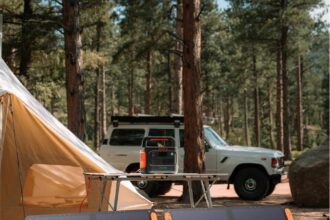Gypsum concrete, also known as gypcrete, is a durable, versatile, and heat-resistant underlayment with many benefits. The material flattens your subfloors and provides quality impact isolation and sound transmission ratings. Gypsum concrete is also lightweight, crack-resistant, and easy to install. Here are five installations you can place over your gypsum concrete underlayment:
Carpets and Sound Control Mats
Sound control mats are simple installations you can place over a gypcrete underlayment. These mats are fabricated to limit impact noise and sound transmission between floors. Sound mats feature resilient rubber noise control underlayment compatible with all floor finishes. You can install these sound control mats over gypsum concrete, or under hardwood and other hard-surface flooring. Carpeting is another cost-effective solution used to cover gypsum concrete underlayment. Material options include fiber, nylon, polyester, wool, and polypropylene, while installation methods range from glue-down to cut-to-fit, strip, and stretch-in.
Epoxy Flooring
One way to protect your gypsum concrete from foot traffic and other damages is by installing a layer of metallic or quartz epoxy. Known for its resilience and versatility, epoxy offers an ideal flooring option that’s easy to install and maintain. Epoxy flooring is resistant to moisture, chemicals, and heat damage and sits over various substructures, including gypsum concrete. These floors are also smooth, seamless, non-slip, visually appealing, and customizable, making them ideal for enhancing concrete surfaces. Epoxy floors are easy to install over gypsum concrete and require minimal surface preparation.
Engineered Hardwood Flooring
Hardwood is another option you have when you want to cover gypsum concrete with more aesthetic flooring. The material is durable, visually appealing, and easy to clean. Hardwood floors also become more stable over time as the wood loses moisture and comes in various finishes. Common options include water-based and oil-based finishes and engineered maple, beech, ash, and oak. Hardwood floors have moderate weight, so your gypsum concrete underlayment won’t crack. Use a moisture-resistant barrier over the concrete to protect your hardwood from moisture damage.
Ceramic Tiles
Installing non-porous ceramic tiles over concrete gives you a resilient, heat-resistant surface that is easy to clean. Ceramic tiles are an ideal match for gypsum concrete underlayment and provide a waterproof surface that protects the gypsum from moisture damage. The dry environment discourages algae, mold, and mildew from growing on your subfloor and protects the adhesives from breaking down. Tiles also promote clean spaces as they’re stain-resistant and easy to disinfect. Other benefits include heat resistance and increased impact absorption bolstered by isolation membranes between the tiles.
Vinyl Planks and Sheets
Another flooring option that sits over gypsum concrete without issues is vinyl sheets and planks. Vinyl is known for its fireproof composition that provides a protective surface for your underlayment during emergencies. The flooring has multiple layers that deliver a softer underfoot feeling and the surface options allow for customization. Vinyl planks come in different colors, textures, and clarity, making them ideal for improving the aesthetic appeal of concrete underlayment. The flooring option is also durable and low maintenance, making it ideal for residential and commercial applications.
Floor Sealers and Primers
Before installing wood, tile, or other flooring options over gypsum concrete, you need to apply a primer. These liquid polymers are designed to enhance the bond between the gypsum concrete and the flooring material. Floor primers are applied, rather than installed and provide other benefits like creating water and heat-resistant barriers. Gypsum concrete suppliers also offer floor sealers, which are clear, water-based polymers applied over the underlayment. Floor sealers create a more stable surface for installing your hardwood, vinyl planks, tile, or epoxy flooring. Sealers also provide vapor barriers to protect your underlayment from water damage.
Work With a Reliable Gypcrete Supplier
Gypsum concrete is a versatile underlayment that works with many types of floors. The underlayment provides a durable, low-maintenance surface ready for your finished floor coverings. Contact an underlayment provider today to find out more about residential or commercial gypcrete flooring solutions.




